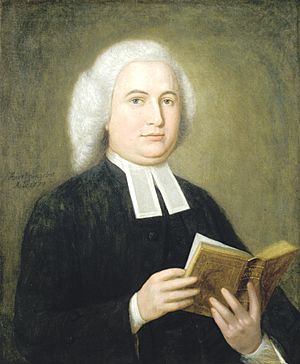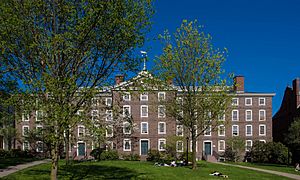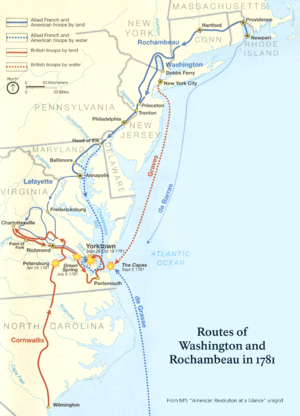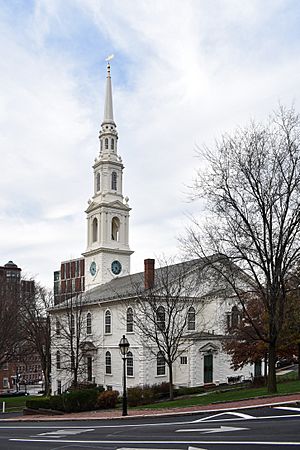James Manning (minister) facts for kids
Quick facts for kids
James Manning
|
|
|---|---|
 |
|
| 1st President of Brown University | |
| In office 1765–1791 |
|
| Succeeded by | Jonathan Maxcy |
| Delegate to the Continental Congress for Rhode Island & Providence Plantations | |
| In office 1786–1786 |
|
| Personal details | |
| Born | October 22, 1738 Elizabethtown, Province of New Jersey, British America |
| Died | July 29, 1791 (aged 52) Providence, Rhode Island, U.S. |
| Resting place | North Burial Ground Providence, Rhode Island, U.S. |
| Nationality | American |
| Spouse | Margaret Stites |
| Alma mater | The College of New Jersey |
| Profession | University president Minister Politician |
| Signature | |
James Manning (born October 22, 1738 – died July 29, 1791) was an important American leader. He was a Baptist minister, a teacher, and a politician from Providence, Rhode Island. He is best known as the first president and a key founder of Brown University. He also served as the minister for the First Baptist Church in America.
Contents
Early Life and Education
James Manning was born in Elizabethtown, New Jersey. When he was 18, he went to Hopewell Academy in Hopewell, New Jersey. There, he studied with Reverend Isaac Eaton to prepare for his religious work.
In 1762, he graduated from the College of New Jersey. This college later became known as Princeton University. At Princeton, Manning studied under President Samuel Finley. Finley believed in sending out "good Scholars and useful members of Society." James Manning was one of the 130 students Finley helped educate.
A few weeks after graduating, Manning married Margaret Stites. He was then publicly ordained as a minister by the Baptist Church in Scotch Plains, New Jersey.
Leading Brown University
In 1764, a group called the Philadelphia Baptist Association sent Manning to start a college in Rhode Island. Rhode Island was a place where Baptists had a lot of freedom. Manning worked with other important people from Rhode Island to found the College in the English Colony of Rhode Island and Providence Plantations. Today, this college is known as Brown University.
Manning was Brown's first president, serving from 1765 to 1791. He first ran the university from his home and the Baptist church in Warren, Rhode Island. In 1770, the university moved to Providence. During his time, Brown built its first main buildings on College Hill. The Brown family helped a lot with this construction.

Reverend Manning gave the college library its first book. It was a large dictionary of several languages by Valentin Schindler. This book was printed in Hanover, Germany, in 1612.
In 1769, Manning led Brown's first graduation ceremony. Seven students earned Bachelor of Arts degrees. Many other people received honorary degrees. During his time as president, 165 men graduated from Brown. These graduates became important people in many fields. They included ministers, lawyers, doctors, teachers, and even congressmen.
During the American Revolution
In 1774, Dr. Manning spoke about the importance of religious freedom. He gave a speech at Carpenters' Hall in Philadelphia. Many important leaders from different colonies were there. He said that people were fighting for civil liberty. He believed they should also fight for "RELIGIOUS FREEDOM."

During the American Revolutionary War, Manning was still president of Brown. In 1780, French troops arrived in Newport, Rhode Island. They were led by the Comte de Rochambeau. These troops came to help American soldiers led by General George Washington.
The allied troops stayed in Rhode Island for a year. Then, in 1781, they marched to Virginia. There, they fought and defeated British forces in the Siege of Yorktown. During the year of preparation in Rhode Island, the Brown campus was used by soldiers. The main college building, later called University Hall, became a military hospital.
Serving in Congress
In 1786, the Rhode Island General Assembly chose James Manning to represent them. He became a delegate in the 7th Congress of the Confederation. In this role, he worked on a committee that suggested important changes to the Articles of Confederation. Manning served in Congress alongside future President James Monroe.
Manning also played a role in getting the United States Constitution approved. When the Constitution was presented to the states, it was not certain if it would pass. Massachusetts was a key state, and its vote was very close. Manning, along with other ministers, helped convince Massachusetts to adopt the Constitution.
Baptist Ministry Work

While he was president of Brown, Manning also served as a Baptist minister. He was first a minister in Warren. Then, from 1771 to 1791, he became the minister of the First Baptist Church in America in Providence.
In 1774–1775, Manning led the church in building its current meeting house. This building was used for worship and for Brown University's graduation ceremonies. Manning's nephew, Stephen Gano, became the pastor of the church after him.
The President James Manning Medal
Brown University gives out a special award each year called the President James Manning Medal. It is given to a graduating student who shows great skill in studying and practicing religion. This award honors James Manning, who was known for his smart thinking and strong spiritual beliefs. The medal recognizes students who balance their faith with a sense of community and global responsibility.
Images for kids
See also
 In Spanish: James Manning para niños
In Spanish: James Manning para niños

